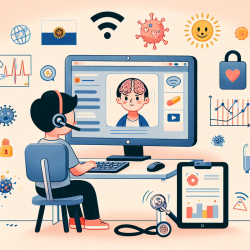As a School Social Worker, the shift to working from home can present both opportunities and challenges. With the rise of telehealth and telepractice jobs, many professionals are finding new ways to connect with students and provide essential services. However, this transition can also lead to feelings of burnout and isolation if not managed properly. Here are some strategies to help you maximize efficiency and well-being while working from home.
1. Establish a Dedicated Workspace
One of the first steps to creating a productive work-from-home environment is to establish a dedicated workspace. This space should be free from distractions and equipped with all the tools you need to perform your job effectively. Having a specific area for work helps to create a clear boundary between professional and personal life, which is crucial for mental well-being.
2. Set a Routine
Maintaining a consistent daily routine can help you stay organized and focused. Set specific work hours and stick to them as closely as possible. This not only helps in managing your time better but also signals to your brain when it’s time to work and when it’s time to relax.
3. Take Regular Breaks
Working from home can sometimes blur the lines between work and rest, leading to extended periods of sitting and working without breaks. Schedule regular breaks to stretch, move around, and give your mind a rest. This can help to reduce stress and prevent burnout.
4. Leverage Technology
Utilize the various technological tools available to make your work easier and more efficient. Video conferencing platforms, scheduling apps, and online therapy services like TinyEYE can help you manage your workload and connect with students more effectively. Familiarize yourself with these tools to maximize their benefits.
5. Stay Connected
Isolation is a common issue for those working from home. Make an effort to stay connected with your colleagues and supervisors through regular check-ins and virtual meetings. This can provide a sense of community and support, which is essential for mental health.
6. Prioritize Self-Care
Taking care of your mental and physical health is crucial, especially when working from home. Incorporate self-care activities into your daily routine, such as exercise, meditation, or hobbies. Remember, you can’t pour from an empty cup; taking care of yourself enables you to better support your students.
7. Seek Professional Development
Continuous learning and professional development are important for staying updated and motivated. Attend webinars, read publications, and participate in online courses to enhance your skills and knowledge. This not only improves your professional competence but also keeps you engaged and inspired.
8. Set Boundaries
It’s important to set boundaries with students, parents, and even yourself. Clearly communicate your working hours and availability to avoid being overwhelmed by requests outside of your designated work time. Setting boundaries helps to maintain a healthy work-life balance.
9. Utilize Telehealth Services
Telehealth and telepractice jobs offer a flexible and effective way to provide services to students. Platforms like TinyEYE provide comprehensive online therapy services that can help you manage your caseload more efficiently. These services can be a valuable resource in delivering high-quality care while working remotely.
10. Reflect and Adjust
Regularly take time to reflect on what’s working and what’s not in your current work-from-home setup. Be open to making adjustments to improve your efficiency and well-being. This ongoing process of reflection and adjustment can help you find the best strategies that work for you.
In conclusion, while working from home presents unique challenges, it also offers opportunities for increased flexibility and efficiency. By implementing these strategies, school social workers can create a productive and balanced work-from-home environment, ultimately enhancing their well-being and the quality of services they provide to students.










